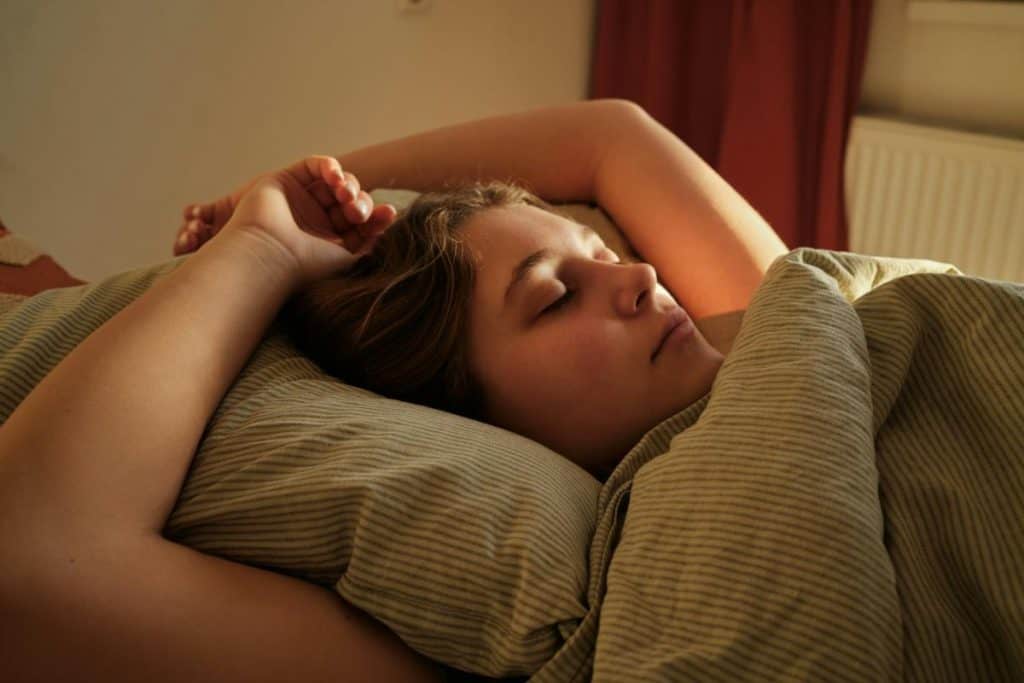Poor sleep is a common problem, and it can seriously affect your health and well-being. Yet the quest for a restful night’s sleep can sometimes feel as elusive as a dream slipping through your fingers. Fortunately, good sleep is within reach, and often, a few simple changes to your daily routine can make a world of difference. Here we’ll explore seven straightforward tips to help you create the perfect environment for rejuvenating sleep.

Create a Calming Bedtime Routine
The hours leading up to your bedtime are key for preparing your body and mind for rest. A winding down routine that’s consistent can signal to your body that it’s time to sleep. Engage in calming activities like reading, gentle stretching, or taking a warm bath. Avoid stimulating activities, such as working or watching TV in bed, which can make it harder to wind down.
Sleep Friendly Lighting
Sleep-friendly lighting plays an important role in setting the right conditions for a restful night. Exposure to bright or blue spectrum lights before bedtime can significantly disrupt the body’s natural preparation for sleep by inhibiting the production of melatonin, the hormone responsible for regulating sleep cycles. As Block Blue Light experts explain, proper sleep lighting eliminates eye strain and maintains optimal health, emphasizing the importance of creating a bedroom environment that supports your body’s nighttime needs.
By choosing lighting options that mimic the sunset’s warm glow, such as lamps with red or orange hues, or investing in bulbs that can adjust color temperature, you can enhance your ability to fall asleep naturally and improve the overall quality of your rest.
Invest in a Quality Mattress
Your mattress is also a big factor in the quality of your sleep. A comfortable and supportive mattress can alleviate aches and pains that might otherwise keep you awake. It’s worth doing your research and investing in a high-quality mattress that meets your needs. Remember, mattresses have a lifespan, and it may be time for a new one if you’re not waking up feeling rested.
Temperature and Sleep
The ideal sleeping environment is cool, typically between 60 and 67 degrees Fahrenheit. Your body temperature naturally decreases as you fall asleep; a cooler room can help facilitate this shift. Consider using a fan or air conditioning to keep your bedroom at an optimal temperature., proper sleep lighting eliminates eye strain and maintains optimal health if you follow the advice of doctors from the world over.
Limit Caffeine and Screen Time

Caffeine is a stimulant that can stay in your system for hours, so it’s best to avoid it in the afternoon and evening. Similarly, the blue light emitted by electronic devices can interfere with your natural sleep-wake cycle. Try to limit screen time to at least an hour before bed, and if you must use screens, consider using blue light filters or special glasses to mitigate the effect.
Evaluate Your Bedroom Environment
The environment of your bedroom can significantly affect your sleep quality. Keep your room as dark as possible to signal your body to produce melatonin, the sleep hormone. Blackout curtains and eye masks can be particularly helpful, especially for those who live in urban areas or work night shifts. Additionally, minimize noise with the help of earplugs or a white noise machine if needed.
Be Mindful of Napping & Regular Exercise
While a short nap can be a great way to recharge, long or late naps can interfere with your regular sleep pattern. If you find that naps make it difficult to fall asleep at night, consider eliminating them or keeping them to a brief 15-30 minutes in the early afternoon.
Regular physical activity can promote deeper sleep, but timing is key. Exercising too close to bedtime can be stimulating, so aim to finish your workout at least a few hours before bed. Gentle activities like massage or stretching can be particularly beneficial in the evening, as they can help alleviate tension and calm your mind.
In a world that seems to be constantly on the move, prioritizing sleep can sometimes feel like a luxury. However, the reality is that sleep is a fundamental pillar of good health, and making it a priority can have a profound impact on your quality of life. By adjusting your sleep environment and behavior, you can pave the way for more deep and restful nights. Remember that these changes don’t have to be drastic—small adjustments can often lead to significant improvements in your sleep patterns. Whether it’s investing in blackout curtains, creating a calming bedtime routine, or simply turning off technology an hour before bed, every little bit helps.

